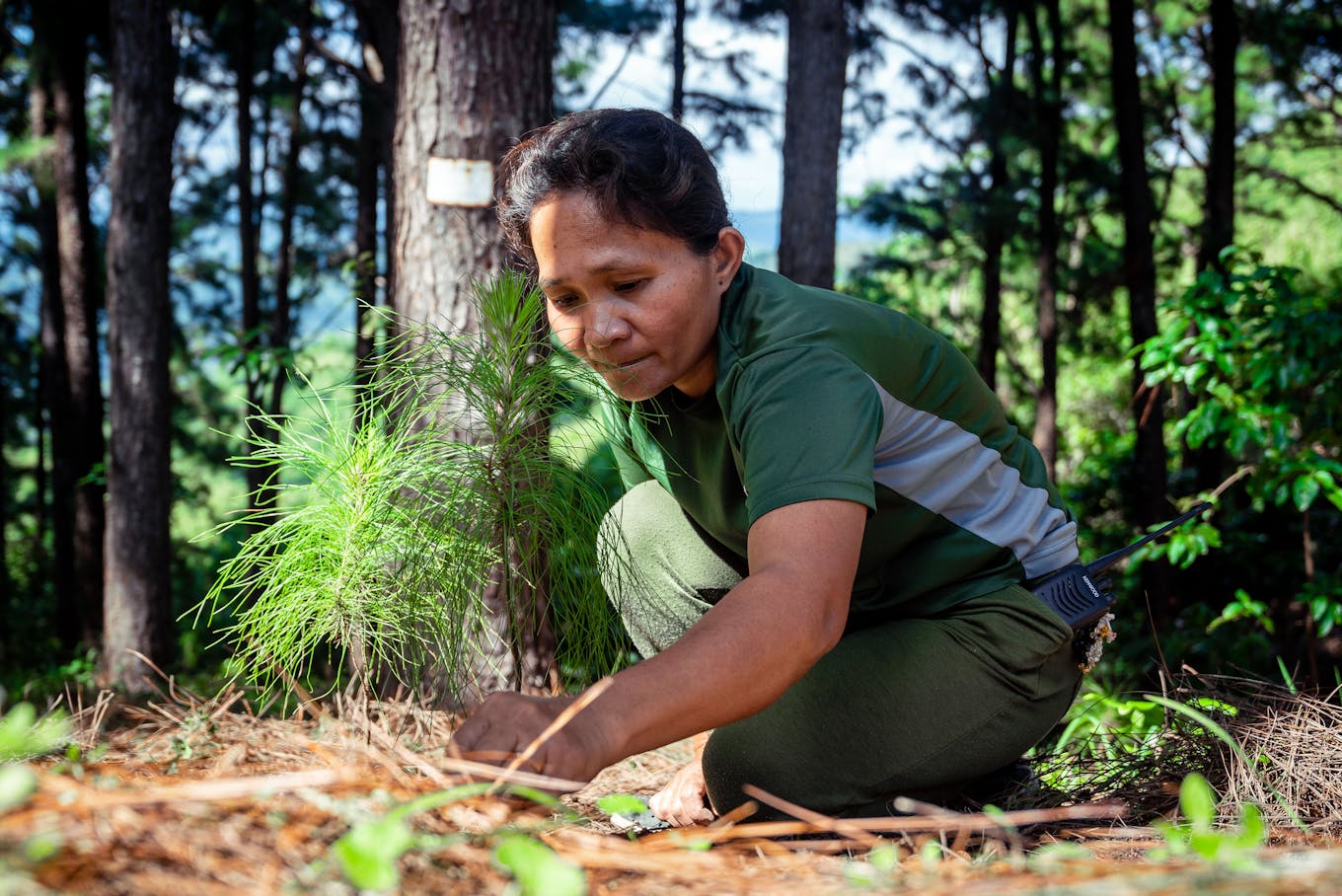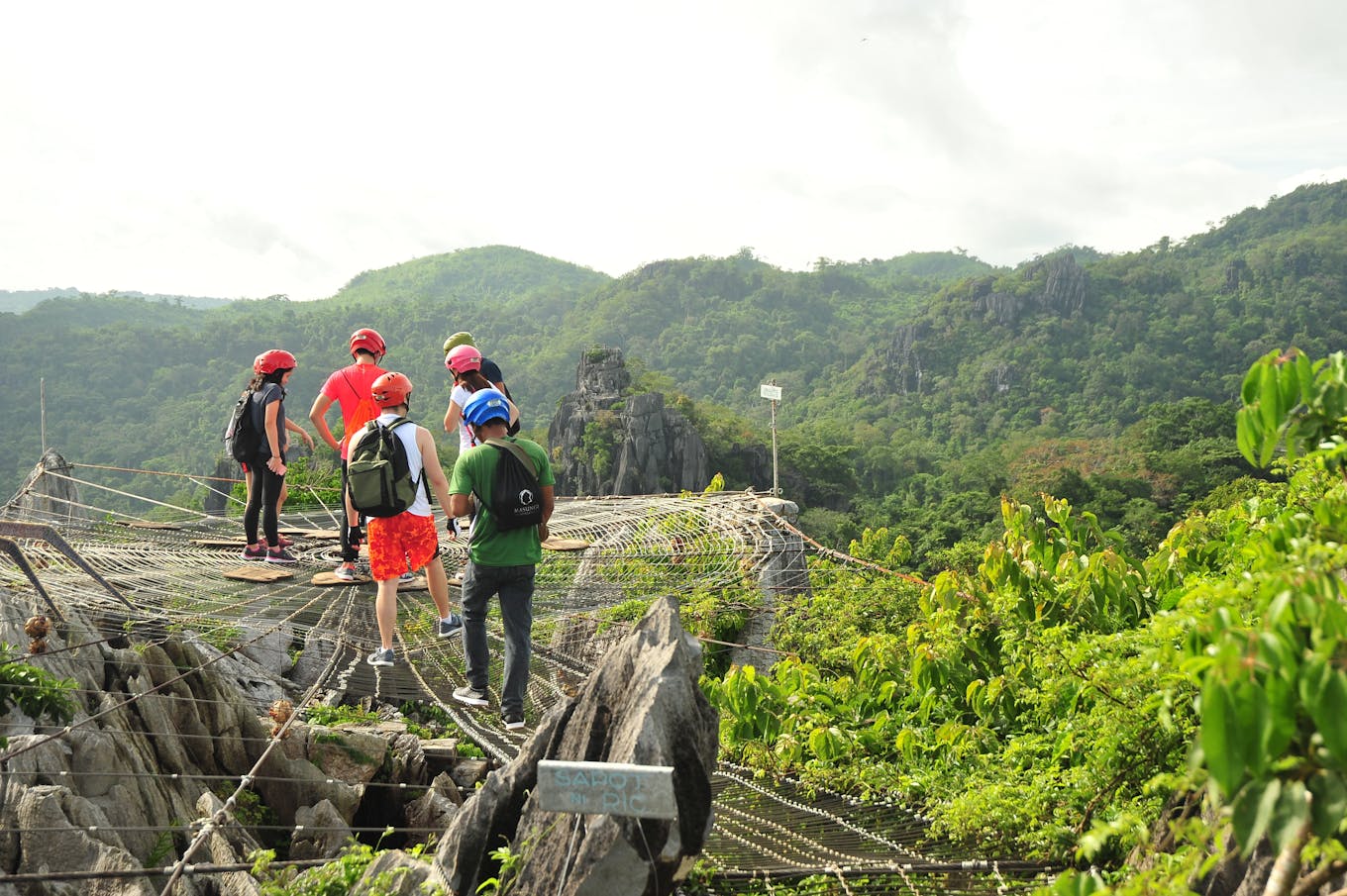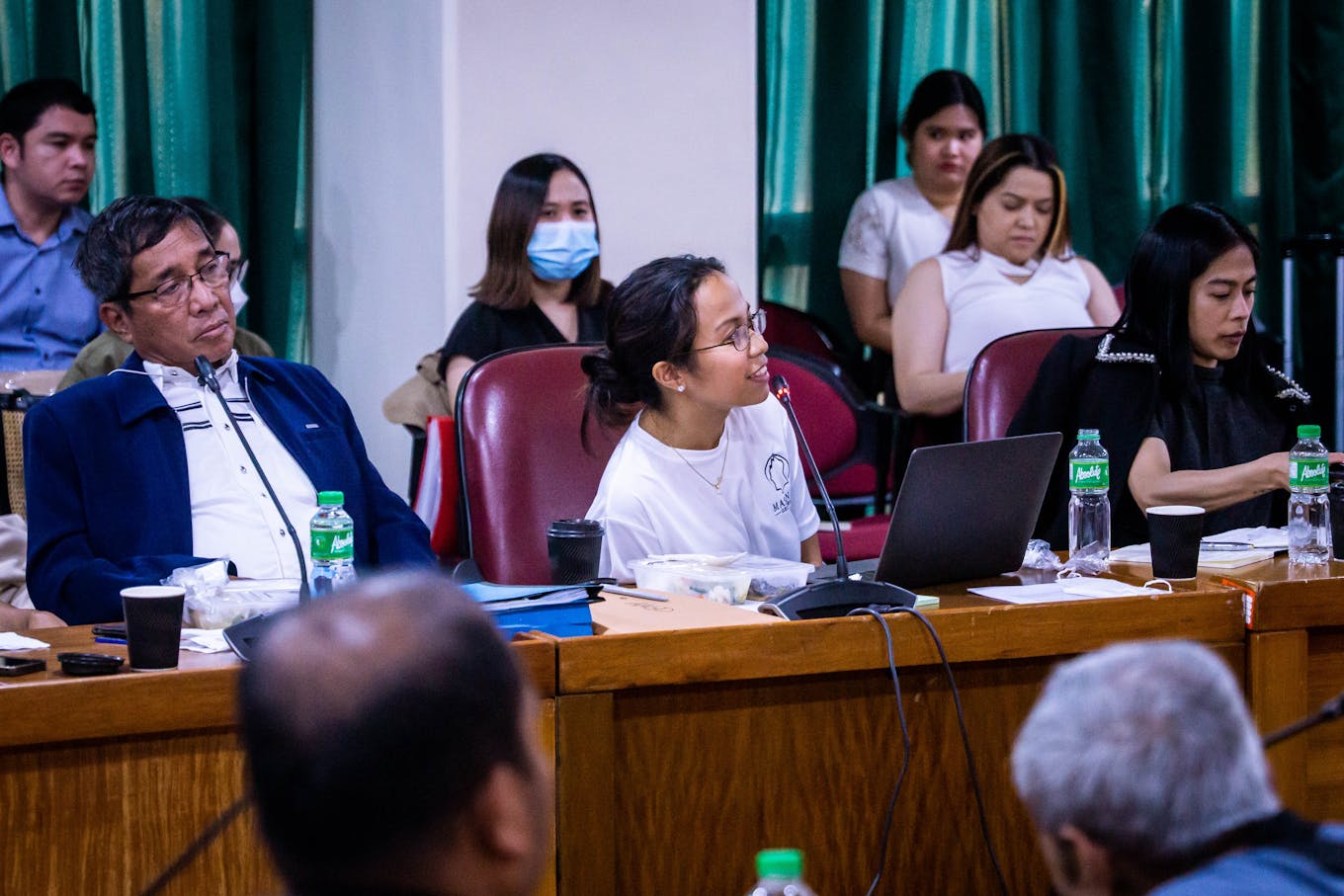Conservationist and geotourism advocate Ann Dumaliang spent a large portion of her formative years on the mountainous trails of Rizal Province, on the cusp of the Sierra Madre mountain range — a vital green lung for the Philippines’ Luzon island — getting to know the “nooks and crannies” of the karst landscape and the wildlife they share the area with.
To continue reading, subscribe to Eco‑Business.
There's something for everyone. We offer a range of subscription plans.
- Access our stories and receive our Insights Weekly newsletter with the free EB Member plan.
- Unlock unlimited access to our content and archive with EB Circle.
- Publish your content with EB Premium.
“I’ve grown up with Masungi and seen it change over the years before my very eyes,” Dumaliang told Eco-Business, recounting the area’s transition from denuded foothills to a lush green corridor.
The Masungi Georeserve’s journey towards restoration, however, has been nothing short of an uphill climb.
A National Geographic Explorer and a regional finalist for Young Champions of the Earth by the United Nations Environment Programme (UNEP), Dumaliang is well aware of the difficulties and dangers of the path she’s chosen — the Philippines being the deadliest country in Asia for land and environmental defenders.
She is co-founder and managing trustee of the Masungi Georeserve Foundation, a conservation group, and her work to restore and protect the biodiverse reserve earned her a place in the Eco-Business A-List Youth, which recognises the region’s most impactful young sustainability professionals.

According to Dumaliang, the Masungi Georeserve Foundation’s reforestation efforts have planted 100,000 native trees in the area since the start of its stewardship. Image: Masungi Georeserve Foundation Inc
Nestled in the upland communities of Pinugay, Baras, Cuyambay, and Tandang Kutyo in Tanay, Rizal, the Masungi Georeserve is a geological park and conservation area known for its distinctive limestone rock formations and stewardship of some 2,700 hectares of degraded forestland — some 50 kilometres east of Metro Manila.
An ark of biodiversity, the area is home to some 500 documented species of endemic wildlife including the endangered North Luzon Cloud Rat, the Luzon Tarictic Hornbill and Mottle-winged Flying Fox, among other vulnerable species.
Despite international accolades from bodies like the United Nations Sustainable Development Goals Action Awards and the International Union for Conservation of Nature, however, stakeholders of the Masungi Georeserve have faced consecutive attacks over the last few years.
Working closely with our rangers and the communities, you come to know that Indigenous people rely heavily on nature. Conservation shouldn’t put forest-dependent communities at a disadvantage.
Ann Dumaliang, managing trustee, Masungi Georeserve Foundation
In 2021, two of the sanctuary’s park rangers sustained serious injuries after being shot at by suspected illegal loggers. Late last year, armed men occupied parts of the sanctuary allegedly intending to cordon off the Kaliwa and Marikina Watershed.
Just this February, Masungi’s campaigners were confronted by some twenty personnel of the Bureau of Corrections (BuCor), as they arrived at the geopark brandishing a title claiming ownership to 270 hectares of the nature reserve, with plans to build a new headquarters in the area.
A #SaveMasungi online signature campaign has been backed by nearly 24,000 supporters and counting. The BuCor has since deferred this proposal after facing heavy public backlash and questioning from Philippine legislators.
In this interview, Dumaliang recounts Masungi Georeserve’s struggle against deforesters and recounts to Eco-Business a piece of advice she got from the late conservation champion and former environment secretary Gina Lopez that she holds on to to this day.
You, in a sense, have grown up with Masungi Georeserve. Could you tell us what your journey has been like being one of the champions of this green corridor, becoming a conservationist at such a young age, and the changes you’ve witnessed in the area firsthand in the past two decades?
Ann Dumaliang: In the last 20 years, I’ve seen not only a change in the forest cover of our conservation area but also a pivotal shift in the local culture. The lush greenery that now envelops Masungi was not there when our dad first introduced us to this area as teens — as he hoped to instil in me and my sister (Masungi Georeserve trustee Billie Dumaliang) at an early age a love for nature and the outdoors — it was a barren, scarred landscape.
Through time, the area has recovered. Masungi Georeserve Foundation’s reforestation efforts have planted some 100,000 native trees already since the beginning of our stewardship. From our perspective, however, there’s no point in planting trees if you’re not able to secure them and secure the land.
Over the years, we’ve encountered at least five land speculators and largescale landgrabbers who’ve tried to occupy forested areas spanning from forty to thousands of hectares. To keep them in check, the foundation has been instrumental in establishing 18 ranger stations across sites that used to be left unmonitored and vulnerable. We now also have around 18 kilometres of monitoring trails.
It’s been inspiring working closely with the local communities, as well. Our forest rangers are from neighbouring communities. Some of them used to be loggers, and some used to work as caretakers for speculators. To see them now on the frontlines protecting the forest, persisting through threats and harassment, to save their “home,” it’s inspiring and very important to these community members.
I’m most proud of how we’re able to do all of this supported by the conservation fees contributed by our guests and trail visitors.

Known for its distinctive limestone rock formations, the Masungi Georeserve is a geological park and conservation area that protects some 2,700 hectares of degraded forestland in the mountainous communities of Pinugay, Baras, Cuyambay, and Tandang Kutyo in Tanay, Rizal-some 50 kilometres east of Metro Manila. Image: Masungi Georeserve Foundation Inc
A lot of the work you do is on the ground, partnering with the local community and other stakeholders. How does it feel to be involved hands-on not, just with Masungi Georeserve’s rangers but also with educating the area’s greater community, as well?
“Masaya” [happy]. We build on each other’s energy. You really get to know the people, you really get to know the landscape, it’s nothing short of an extended family. At Masungi, you’re exposed not only to the outdoors and the wildlife around you but also introduced to a lot of the people on the ground who enable nature to thrive. You see firsthand how communities near these forested areas live.
There are a handful of environmental education initiatives that we’re running with the schools around us, as well as the downstream communities. We’ve just concluded a partnership with the Canadian Embassy to educate 100 teachers on watershed management and watershed education in communities closest to these natural resources.
If you don’t understand how the life around you interconnects, it’s difficult to imagine a path to sustainability. There are more site-specific actions that can prove more impactful to our nature and communities than simply avoiding single-use plastic or turning off your electricity for an hour. Being on the ground, it becomes easier to also see what kinds of solutions are needed and how some of them need not be complicated.
Working closely with our rangers and the communities, you come to know that Indigenous people rely heavily on nature, their lives are so intertwined with their surroundings, and their traditional knowledge values the environment the most. Conservation shouldn’t put forest-dependent communities at a disadvantage.

Dumaliang speaks during a meeting of the Committee on Natural Resources in the Philippine Congress. Image: Masungi Georeserve Foundation Inc
Tell us about the work and milestones Masungi Georeserve has been able to accomplish in the last year. What are you most proud of that your organisation has been able to achieve?
We received three global awards last year and two national awards, but when it comes to a specific outcome that we’ve been very proud of and that we’re really inspired by, it’s definitely the cancellation of the three illegal quarries encroaching on our reforestation site, which was formally announced and verified just this February.
That’s a huge accomplishment because having these rock formations that we’ve been protecting quarried would certainly level them to the ground, destroy decades of hard work, and hurt a lot of people considering this spans a watershed area critical to 20 million Filipinos.
The amount of collaboration and the amazing people who dedicated so much of their skills and time just to make it happen has been very inspiring for the team. To the 80 members of Upper Marikina Watershed who’ve been pushing with us for three years, our visitors and our guests on the trail, and the indigenous elders who lent their weight and their voice, we are thankful. It just really goes to show what a movement can do when it comes to overcoming inertia.
This past year helped me realise the capability to see beyond myself, to recognise that it’s worth it to take a few hits for the benefit of the greater good and to strive to make a difference.
When we started Masungi Georeserve, I thought it would just be about engendering love for the environment, among a population that has grown out of touch with nature. I had no idea that it would involve a lot of challenges when it comes to enforcement and political interference, and that we really would have been performing a bit of a watchdog function.
You’ll get hit with misinformation, you’ll get criticised, and you’ll get targeted for harassment. But there’s nothing like the feeling of making a difference in a space like this.
Why do you think Masungi Georeserve has been targeted by consecutive attacks not just from developers and potential landgrabbers, but even some government agencies as of late?
I think a lot [of the recent attacks] have to do with the activities we’ve been surfacing that have traditionally been allowed to thrive in this area even though they are illegal and incompatible with these zones.
Many people still believe that land that is unbuilt is unused land, when in truth, as far as conservation is concerned, as far as protected areas are concerned, these are actually life-giving ecosystems that we all depend on. There’s value and protecting it as it is.
“
Persist. A lot of conservationists have said that apathy is the greatest challenge to conservation. If you are finding opposition, if you’re finding challenges, that means you’re coming closer to the root of the problem.
Ann Dumaliang, managing trustee, Masungi Georeserve Foundation
What keeps you going despite all the difficulties and challenges you face?
It’s really not always easy. I’m not going to deny, it can get pretty taxing. But if there’s anything that we’ve learned, enduring and persisting really does make a difference. Being “makulit” [stubborn] does make a difference.
Being “makulit” is never being afraid to speak up, to speak the truth to power, to call attention to the ills of society. It’s not feeling apathy towards the situation. It’s always remaining hopeful, even if it might seem difficult to see the endgame.
You just really have to roll with the punches. And so long as you don’t give up. As long as you’re still standing, you’re still winning.
What’s one piece of advice you’d like to impart to other young Filipino conservationists and environmental champions?
Persist. A lot of conservationists have said that apathy is the greatest challenge to conservation. If you are finding opposition, if you’re finding challenges, that means you’re coming closer to the root of the problem. So don’t look away. Continue pursuing it, continue looking deeper.
This is something I picked up from [the late environment secretary] Gina Lopez: It’s that genuine love is all about action. So make sure that you are able to transform your love for the environment into action, that’s the true demonstration of love. If you’re not willing to act on it, question yourself. Gather the courage to take action, every little thing really makes a difference to stir a ripple of change.
The interview has been edited for brevity and clarity.
Ann Dumaliang was one of 10 young sustainability leaders selected for the Eco-Business Youth A-List 2022. Read our stories with the other winners here.





















